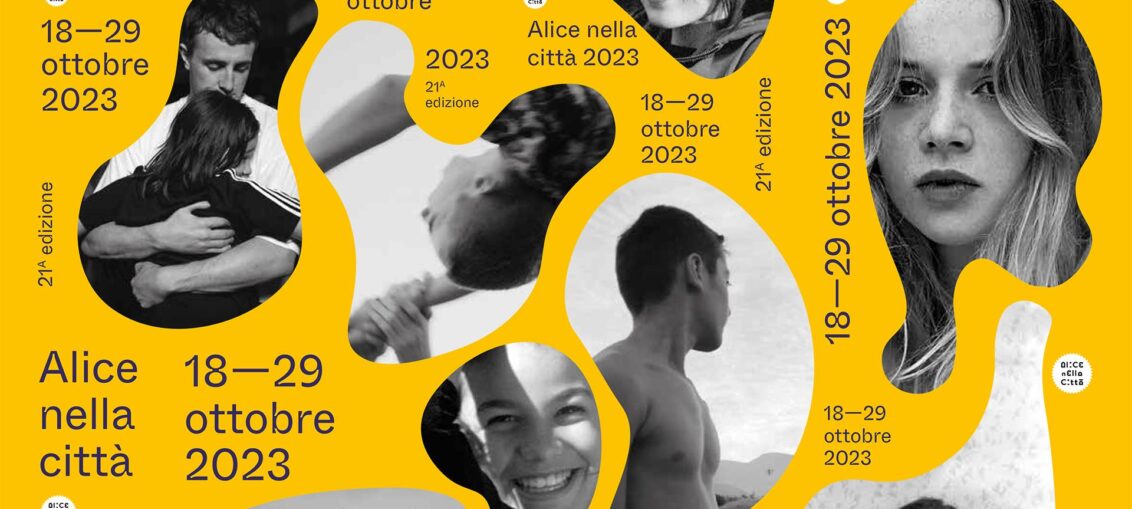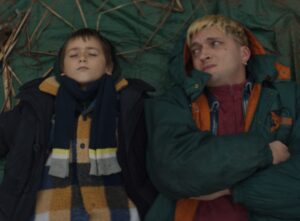
(from Rome Luigi Noera with the kind collaboration of Stefano Sica and Valentina Vignoli – Photos are published courtesy of the Fondazione Cinema per Roma)
From the ALICE IN THE CITY COMPETITION stories of broken families
 The Other Son by Juan Sebastiàn Quebrada – Colombia, France, Argentina, 2023, 89’
The Other Son by Juan Sebastiàn Quebrada – Colombia, France, Argentina, 2023, 89’
SYNOPSIS Federico and his brother Simon live their adolescence to the full, until the day Simon dies when he falls from the balcony during a party. As his family falls apart before his eyes, Federico tries to live a normal life during the last weeks of school. Unable to cry, starts to get closer to Laura, his dead brother's girlfriend and seems to find comfort in her.
REVIEW
The Alice in the City of Rome section shows us the directorial debut of the Colombian Juan Sebastiàn Quebrada through an emotionally heartbreaking film that deals with the mourning process in a family following the sudden death of their son.
Simon he is a seemingly calm boy, who is experiencing the delicate period of adolescence amidst dreams, fun, illusions and disappointments. Nothing suggests an extreme gesture from the boy and not even his stable affections hypothesize this distant fantasy. Yet at a party like many others, his friends find him dead in a pool of blood following a fall from the balcony.
The effects of the boy's death have a devastating effect on the family, in which everyone processes mourning in their own way. The father goes in search of a hypothetical moral culprit to shift the responsibility onto someone and to take the weight of this pain off his shoulders. The brother Federico closes in apathetic silence, not talking to anyone about the episode and trying to continue his life undaunted. The boy, keeping everything inside, it will take on the appearance of a gas cylinder, building pressure until an inevitable explosion. Simon's girlfriend too – Laura – she is very shaken by what happened, as the last person to have seen the boy alive before the extreme gesture. Throughout the story Laura and Federico, united by a state of mutual pity, they will get very close until they form an emotional bond that will turn into a relationship.
The family member who will suffer the most from the trauma of losing their child will be Mother. Through a splendid performance with many heartbreaking scenes, the character expresses all his pain in a constant rise of mental exhaustion: from the desperate screams in the hospital, to the days spent at home watching and rewatching Simon's videos as a child, until you have apparitions of the boy or hear his voice in your sleep. All this will cause the mother to enter a depressive vortex until she is admitted to a psychiatric hospital. In the end he will be able to overcome the moment of crisis, but like all the other characters, he will carry this painful scar on his skin for his entire life.
The director emphasizes the numerous moments of pain through the skilful use of the camera, which insists on the proposition of numerous close-ups and very close-ups which reflect the gaze lost in space and the pain suffered by the protagonists. The choice to include many scenes filled with deafening silence or with the surrounding environment muffled, it does nothing but load the story with human drama. The choice of a relationship between Federico and Laura turns out to be successful despite proving controversial. Their closeness is given more to the shared mourning and the past traumatic period rather than to the real feeling of love.
The other son ends the film with the same event with which it began: a kids' party. The message that we wanted to convey to the viewer is perceptible, on the same wavelength as the song “Show must go on” by Queen: the life, albeit slowly and gradually, resumes for everyone. A light ending that contrasts with an overall painful work, capable of creating strong dismay in the viewer.
 Me and Il Secco by Gianluca Santoni – Italy, Croatia, 2023, 99’
Me and Il Secco by Gianluca Santoni – Italy, Croatia, 2023, 99’
SYNOPSIS Denni is a child of 10 years with a mission: save the mother from the father's violence. For this he devises an infallible plan: he will have his father killed by a super-killer. Too bad the super-killer he comes across is Secco, who only looks like a criminal and, mostly, he desperately needs money.
REVIEW
Violence against women is a very hot topic in this historical period, and the director wanted to represent it in an atypical way: under the gaze of an innocent child, who feels helpless when observing violent circumstances, but at the same time he would like to find a solution to return the family to a state of calm. This is the necessary prerequisite for reading the film Io e il Secco, in which Denni, just a little boy 10 years grew up too fast, he pushes himself to extreme action that goes beyond any imagination.
A child's mind travels at double the speed in terms of understanding that of an adult, it is no coincidence that the study of languages in the first years of life is quicker than if carried out later. The teachings are as well as didactic, they can be moral, and here Denni's character is a mirror of his family situation: a mixture of suffering and violent thoughts.
The choice of instigator of the murder falls on Secco: an adult boy from the suburbs, with a past of destroyed human relationships caused by his mistakes and a present made of apparent but fallacious friendships. The soul of the tough guy soon decays into a weak character full of regrets for all the mistakes he has made, which he can no longer remedy. The new couple of Denni and Secco – the innocent child who has a murderous soul and the super killer who proves fragile – it is very functional from a human point of view, with the age difference proving irrelevant to the detriment of the protagonists' feelings, which are highlighted by the director.
The presence of some fantastic scenes built in Denni's mind combined with other surreal and comical scenes, they add to the work that imaginary and flowing part necessary to lighten the film from being only dramatic and reflective, to make it enjoyable enough for the viewer. An interlocking narrative that involves numerous current themes: violence against women, the suburbs, the underworld and the imaginary universe of children; all this makes the overall work take on a more fantastic than realistic character.
Stefano Sica
